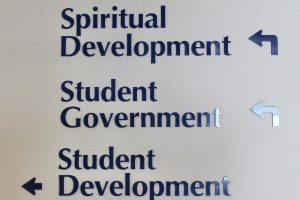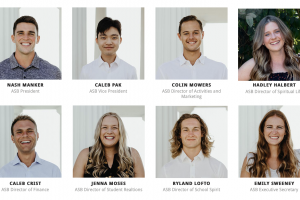More than 60 students attended PLNU alumnus Dr. Scott Wylie’s neuropsychology research presentation last Monday on how deep brain stimulation can lessen the side-effects of Parkinson’s disease.
Wylie, hosted by PLNU’s chapter of Psi Chi, the National Honor Society for Psychology, explained how deep brain stimulation works by implanting a small wire with several electrodes into the subthalamic nucleus of the brain and applying electrical impulses to stimulate the region to diminish the side-effects of Parkinson’s, which include shaking, slowing of movement and some cognitive deficits.
In addition to presenting his research, Wylie shared his journey and how through hard work and “luck” he became an assistant professor and a researcher at VanderbiltUniversity’s School of Medicine in Tennessee.
“Hard work always pays off,” Wylie said. “And one of the toughest things to do is research.”
Even if students didn’t want to pursue a career in research, Wylie recommended they get involved with a research project, especially those looking to apply to graduate programs.
“Research makes you competitive,” Wylie said.
Despite working in a secular environment, Wylie’s faith still influences his work and ethics.
“It’s a theology of love,” said Wylie. “It comes down to how we treat people and our colleagues and their different views and beliefs.”
There was a fairly large turnout from the department according to sophomore Ben Fausey.
“I haven’t been to many of the other events, but the Colt Forum was packed to the point where people were sitting on the floor in the back,” said Fausey. “The presentation was informative and showed many behind the scenes methods for treating Parkinson’s.”
Kim Schaeffer, PLNU professor of Psychology, said that Wylie inspires students to pursue their goals while seeking Jesus.
“This was a great opportunity for our psychology majors and others to rub shoulders with someone who is not only following his passions but succeeding at the highest level,” said Schaeffer. “I hope our students left thinking, great things can happen to me if I follow my passions, work hard, seize opportunities that might require me to work even harder, and stay true to Jesus.”
Wylie was also in town to present his work at the Society for Neuroscience Annual Convention along with around 30,000 neuroscientists who came from around the world to view presentations from experts in the field.






